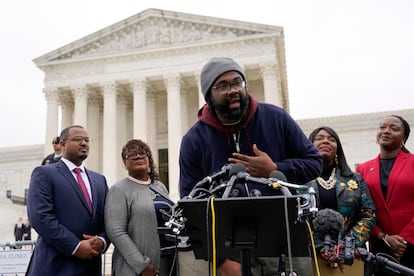Supreme Court rules in favor of Black voters in Alabama redistricting case
Chief Justice John Roberts and Justice Brett Kavanaugh joined with the court’s liberals in ordering the creation of a second district with a large Black population

The Supreme Court on Thursday issued a surprising 5-4 ruling in favor of Black voters in a congressional redistricting case, ordering the creation of a second district with a large Black population. Chief Justice John Roberts and Justice Brett Kavanaugh joined with the court’s liberals in affirming a lower-court ruling that found a likely violation of the Voting Rights Act in an Alabama congressional map with one majority Black seat out of seven congressional districts in a state where more than one in four residents is Black.
The case had been closely watched for its potential to weaken the landmark voting rights law.
The court had allowed the challenged map to be used for the 2022 elections and at arguments in October, the justices appeared willing to make it harder to use the voting rights law to challenge redistricting plans as racially discriminatory.
The chief justice himself suggested last year that he was open to changes in the way courts weigh discrimination claims under the part of the law known as section 2. But on Thursday, Roberts wrote that the court was declining “to recast our section 2 case law as Alabama requests.”
Roberts was part of conservative high-court majorities in earlier cases that made it harder for racial minorities to use the Voting Rights Act of 1965 in ideologically divided rulings in 2013 and 2021.
The other four conservative justices dissented Thursday. Justice Clarence Thomas wrote that the decision forces “Alabama to intentionally redraw its longstanding congressional districts so that black voters can control a number of seats roughly proportional to the black share of the State’s population. Section 2 demands no such thing, and, if it did, the Constitution would not permit it.”
The current case stems from challenges to Alabama’s seven-district congressional map, which included one district in which Black voters form a large enough majority that they have the power to elect their preferred candidate. The challengers said that one district is not enough, pointing out that overall, Alabama’s population is more than 25% Black.
A three-judge court, with two appointees of former President Donald Trump, had little trouble concluding that the plan likely violated the Voting Rights Act by diluting the votes of Black Alabamians. The panel ordered a new map drawn.
But the state quickly appealed to the Supreme Court, where five conservative justices prevented the lower-court ruling from going forward. They allowed last year’s congressional elections to proceed under the map that the lower court had said is probably illegal.
At the same time, the court decided to hear the Alabama case, and arguments were held in early October.
Louisiana’s congressional map, also identified as probably discriminatory by a lower court, was allowed to remain in effect by the Supreme Court, too.
Partisan politics underlies the case. Republicans who dominate elective office in Alabama have been resistant to creating a second district with a Democratic-leaning Black majority, or close to one, that could send another Democrat to Congress.
The judges found that Alabama concentrated Black voters in one district, while spreading them out among the others to make it impossible for them to elect a candidate of their choice.
Alabama’s Black population is large enough and geographically compact enough to create a second district, the judges found.
Alabama argued that the lower court ruling would have forced it to sort voters by race and the state insisted it is taking a “race neutral” approach to redistricting.
At arguments in October, Justice Ketanji Brown Jackson scoffed at the idea that race could not be part of the equation. Jackson, the court’s first Black woman, said that constitutional amendments passed after the Civil War and the Voting Rights Act a century later were intended to do the same thing, make Black Americans “equal to white citizens.”
Jackson and the other two liberals on the court, Justices Sonia Sotomayor and Elena Kagan, said a decision like the one issued Thursday would result in many fewer districts drawn to give racial minorities the opportunity to elect their candidates of choice.
Sign up for our weekly newsletter to get more English-language news coverage from EL PAÍS USA Edition
Tu suscripción se está usando en otro dispositivo
¿Quieres añadir otro usuario a tu suscripción?
Si continúas leyendo en este dispositivo, no se podrá leer en el otro.
FlechaTu suscripción se está usando en otro dispositivo y solo puedes acceder a EL PAÍS desde un dispositivo a la vez.
Si quieres compartir tu cuenta, cambia tu suscripción a la modalidad Premium, así podrás añadir otro usuario. Cada uno accederá con su propia cuenta de email, lo que os permitirá personalizar vuestra experiencia en EL PAÍS.
¿Tienes una suscripción de empresa? Accede aquí para contratar más cuentas.
En el caso de no saber quién está usando tu cuenta, te recomendamos cambiar tu contraseña aquí.
Si decides continuar compartiendo tu cuenta, este mensaje se mostrará en tu dispositivo y en el de la otra persona que está usando tu cuenta de forma indefinida, afectando a tu experiencia de lectura. Puedes consultar aquí los términos y condiciones de la suscripción digital.








































